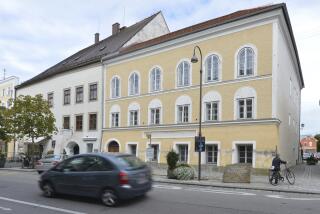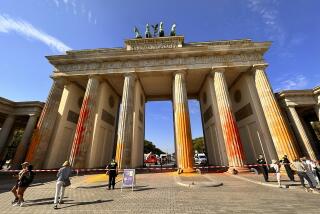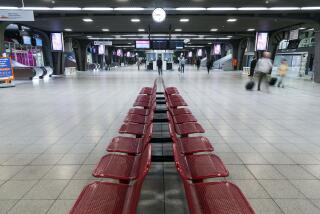Gate Cleanup May Wipe Out Parties
- Share via
BERLIN — It has survived two world wars above it, subway tunneling below it and more than 200 years of horses, humans and vehicles hurtling through its majestic pillars.
But the Brandenburg Gate, this capital’s premier landmark and symbol of German reunification, is about to fall victim to party poopers.
The famous sandstone arch and the elegant boulevard Unter den Linden on its eastern side will no longer be exposed to the ravages of New Year’s Eve or Love Parade reveling, by order of the three Berlin borough governments with power over the monument’s fate.
The ostensible reason for removing the gate from its recently acquired role as essential street-party backdrop is to allow the first sprucing since World War II of the last of Berlin’s original 14 city gates. Decades of grime clog the porous stone of the Doric columns and quadriga-crowned neoclassical frieze, which will be shrouded for the next 18 months while workers laser off the residue.
“Astoundingly, the structure itself is in great shape. There are no concerns about its sturdiness. It’s just very dirty,” says Petra Reetz, spokeswoman for the Berlin city government, which is supervising the cleanup but has had to bend to the will of borough officials who have seized on the restoration as an excuse to ban parties.
Like others who view the famous gate as an important east-west meeting point, Reetz suspects that the decision to block it off during big celebrations is motivated by old-time Berliners’ distaste for the noise, disruptions and damage inflicted by the parties. Annual Unity Day street fairs, New Year’s Eve parties and the summer Love Parade each draw upward of 1 million people. The last “Silvester in Berlin” party--a sponsored brand-name event to ring in the new year--brought 2 million visitors who left behind tons of trash.
“Some Berliners just haven’t gotten used to this being the capital now,” Reetz says. “In Bavaria, Germans love to stage big parties. But here, there isn’t that tradition, and some people resent these huge influxes.”
Those promoting Berlin as a tourist destination, though, say the numbers speak for themselves.
“Most Berliners are proud that their city is now famous for the Love Parade and New Year’s Eve,” insists Natascha Kompatzki of Berlin Tourism Marketing. Like the event promoters, the private tourism agency is now embarked on damage control to rescue what it can of the popular setting.
Negotiations Set
Officials from the Mitte, Tiergarten and Wedding boroughs are to begin negotiations with promoters today to determine how much of the western side of the established party setting will be sealed off for the public good.
“There will be a New Year’s Eve party. This is certain. The Berliners are the main ones who want this,” says Willy Kausch, the “Silvester in Berlin” organizer, who expects to spend more than $3 million on this year’s party. “This is now the biggest New Year’s party in Europe, and the politicians have to keep that in mind.”
The gate has emerged as a symbol of reunification since the hated Berlin Wall, which locked it off from both sides, was felled by the will of anti-Communist demonstrators in 1989.
Adding aesthetic insult to injury is the private sponsorship of the cleanup. In exchange for funding the cosmetic improvements, Deutsche Telekom negotiated the right to use the shrouded monument as a billboard for promotional messages in man-sized pink letters.
Borough officials cite security in justifying their decision to banish revelers from the eastern side, including the Pariser Platz, a plaza that was the heart of Berlin’s cafe society before the Nazi and Cold War eras. The authorities note that emergency vehicles cannot make their way through the throngs of party-goers.
“I don’t expect the gate to play any role at all in the New Year’s party,” says Thomas Flierl, a councilman for the Mitte borough and chief proponent of the restrictions. “This venue becomes much more dangerous when it is a construction site.”
Security Concerns
However, automobile traffic will continue unhindered through the busy gate during the cleanup, raising the question--at least in pro-celebration circles--of why the work poses risks for pedestrians but not drivers.
“There are legitimate security concerns,” Reetz says of the street parties. “But Berlin is going to have to get used to its new role as host for such events. The Brandenburg Gate is now as much a New Year’s venue as is the Champs-Elysees [in Paris], and you can’t keep people away from what they consider their national symbol.”
More to Read
Sign up for Essential California
The most important California stories and recommendations in your inbox every morning.
You may occasionally receive promotional content from the Los Angeles Times.














